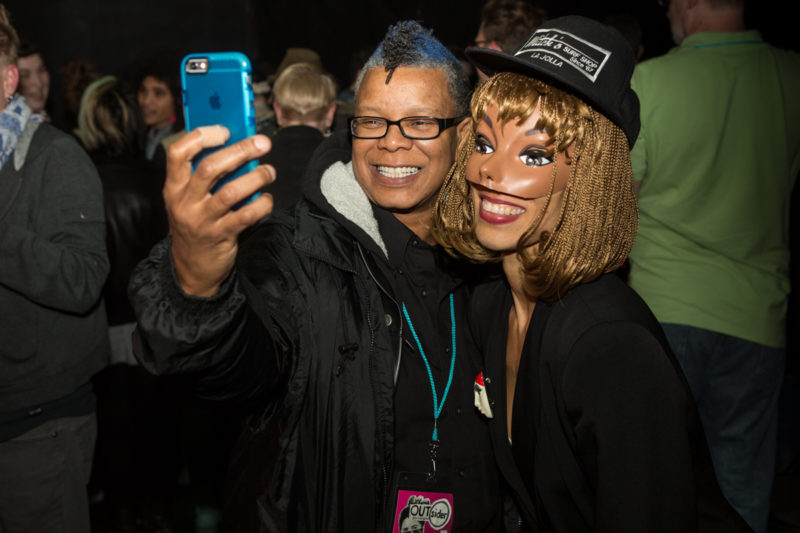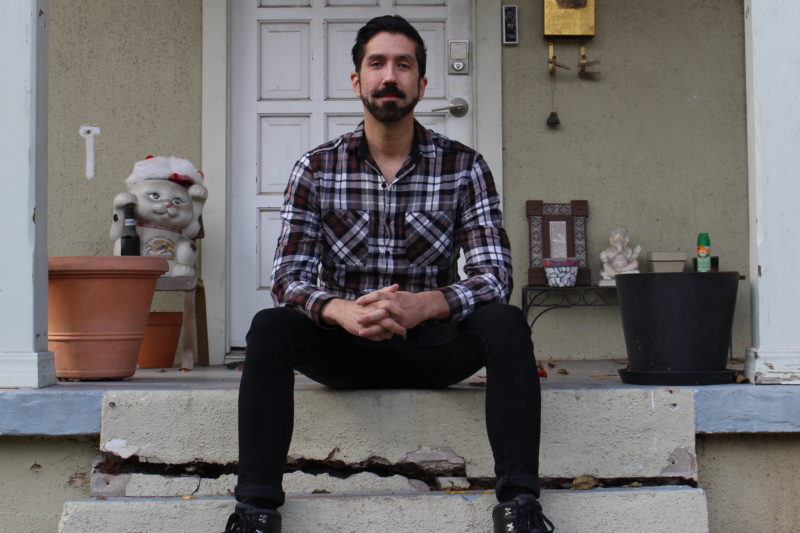How Austin’s LGBTQ Community Hopes to Recover from COVID’s Cultural Vacuum
By Krissi Reeves
Reporting Texas

KB Boyce, left, poses with Brooklyn Based performance artist Narcissister after a live performance during a pre-pandemic OUTsider fest in Austin, Texas. Intimate, in-person interactions were key to the annual festival’s experience before COVID pushed the event online in 2021. Photo courtesy of Patrick Bresnan
Every first Wednesday of the month for nearly seven years, an energetic throng of people showed up at Cheer Up Charlie’s in downtown Austin to share, listen and explore the world through live storytelling.
Together, narrators — both polished and novice — and audiences would navigate the delicate nuances and complex realities of queer life. They would plunge into painful trenches of vulnerability and ascend to exhilarating moments of affirmation. The shows were both raucous and tender, creating a distinctly communal experience between those on stage and those in seats.
“Greetings from Queer Mountain!” created a public stage for self-expression that quickly grew into a thriving community.
“To experience radical, open queerness being applauded can feel reifying and empowering when you still hold shame, guilt and uncertainty about whatever makes you queer,” said Ralph Hardesty, the show’s co-founder and producer.
On March 3, 2020, Hardesty hosted the monthly storytelling event around an eerily foreshadowing theme: “MADNESS.” Shortly after, a world-stopping pandemic halted the show indefinitely. Hardesty, a standup comedian, now almost exclusively performs from home and shares content through his Twitch channel.
“Greetings from Queer Mountain!” is one of Austin’s many in-person LGBTQ-focused arts events that went dark or digital during the height of the pandemic — creating a cultural and communal vacuum in a city home to an estimated 90,000 LGBTQ residents.
As venues, bars and theaters shut their doors and cultural funding dried up because of COVID, many Austin LGBTQ arts organizers struggled to keep their heads above water and found it increasingly difficult to connect with their communities.
Austin has the third-largest per-capita LGBTQ population in the nation, according to an analysis by UCLA’s Williams Institute. But the city does not have a designated LGBTQ community or cultural center — leaving the heavy lifting of community building to independent artists such as Hardesty, nonprofit organizations and venues.
OUTsider, a queer transmedia arts festival, specifically designed its festival experience to be rooted in intimacy. In addition to five days of live performances at the Vortex Theatre in East Austin, attendees in pre-pandemic times could gather for a daily “Conference on the Couch,” a series focused on creating closeness between people — allowing for audiences, artists, and academics to interact with one another without the traditional barriers or power dynamics that often exist within cultural activities.
The OUTsider queer arts festival is traditionally held each February. In 2021, the festival organizers reluctantly transitioned to an online event. Winter Storm Uri prompted its postponement until March.
“In some ways, it’s the festival I’m most proud of because we pulled it together despite multiple traumatizing events,” said Curran Nault, artistic director of OUTsider and assistant professor of radio, television and film at the University of Texas at Austin.

Curran Nault, OUTSider artistic director and assistant professor of radio, television and film at the University of Texas at Austin, sits on his porch in Central Austin on Dec. 6, 2021. Nault, like many arts organizers, retreated to online festival programming in 2021 due to the pandemic. Krissi Reeves/Reporting Texas
Nault is now working to bring back the in-person festival in February 2022.
“A sense of intimacy is so key to what we do,” Nault said.
Nault founded the festival in 2013 in response to his own experience coming of age in the small town of Holliston, Massachusetts in the 1980s.
“I grew up in a time when there was no representation on TV, in film. There was no way for me to see myself anywhere or connect with my community,” Nault said. “That experience has defined my existence.”
Nault says the festival taps into the existing strengths of the queer community: creating your own family, creating your own community and supporting one another.
But there is more work to be done.
“It’s easy to get sucked up in the progress narrative of, ‘Oh things are better now.’ And they are in certain ways. But there are still so many things the community needs,” Nault said. “I think we need each other as much, if not more, than ever.”
The City of Austin’s recently-released 2021 LGBTQIA+ Quality of Life study does show progress. According to the study, 66% of the metro area’s LGBTQ residents reported they were satisfied with the overall quality of life in the city, and 83% said they felt accepted by their family and friends. The report also noted that most respondents head out to bars, clubs and community events to find social connection — places where the arts generally thrive.
But the report also highlights significant disparities in the quality of life for LGBTQ people of color, youth and elderly and for Austin’s transgender residents.
The Austin-based nonprofit allgo, has worked for 35 years to provide vital services to increase the quality of life for Texas’ queer people of color. It serves its mission through three areas of focus: health and wellness, social justice and cultural arts.
Its arts programming includes writing workshops, dance performances and community singalongs. Allgo’s arts programming is offered at no cost to the community.
“We had to obviously think creatively — as a lot of organizations did — to transition into virtual programming,” said allgo programming coordinator Bryan Garcia. “But we still didn’t make up for that very valuable, very tangible in-person experience.”
On Nov. 2, allgo hosted its first in-person event since the pandemic began — a Día de los Muertos altar exhibit and celebration at the organization’s Community Courtyard in East Austin.
“That was a very moving experience for me. It was very profound. It was very powerful to see people in person again,” Garcia said.
The organization is slowly starting to look forward and plan for in-person events. For now, however, it is continuing to focus on virtual programming. On Dec. 12, it is hosting an online special featuring interdisciplinary tap dance artist Michael J. Love. Although the group has faced significant setbacks, Garcia says it is in its best financial position in a long time and poised for a strong 2022.
The All Genders, Lifestyles, and Identities Film Festival, or aGLIFF was founded in 1987 as the Austin Gay and Lesbian Film Festival. The organization served an estimated 10,000 people yearly through its festival and community programming before the pandemic. In 2021, the nonprofit has served an audience about half that size for its hybrid in-person/digital format.
The organization also saw a nearly 50% decrease in its City of Austin cultural arts funding — a number that is expected to significantly decrease again in 2022 because of drops in the hotel taxes that make up the arts fund.
“It’s been hard,” said Bears Rebecca Fonte, aGLIFF’s artistic director. “It’s definitely forced us to come up with some creative solutions for things. I think it’s made us better at what we do. But it’s put us behind financially, and we feel less connected even though we are trying to find more connections.”
Along with its marquee event, PRISM Film Fest, the organization produces the Queer Youth Media Project, Queer Black Voices Fund and a Queer Spectrum Monthly Screenings.
In August 2022, the film festival will celebrate its 35th anniversary. The plan is to host a fully in-person event. Fonte notes that the importance of gathering in person is two-fold: the shared experience of seeing representation on screen and the ability to make professional and creative connections with the community.
“We have to learn our stories through our chosen family, from the community around us, from people who are like us,” Fonte said. “ And, I think it’s necessary for us to see films together.”
Without in-person events, Fonte said, the community loses the ability to collaborate and make the vital connections that strengthen their wellbeing and create future personal and professional opportunities.
And when you can’t do that, “it’s really a loss,” Fonte said.